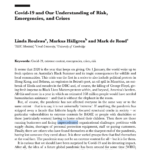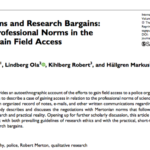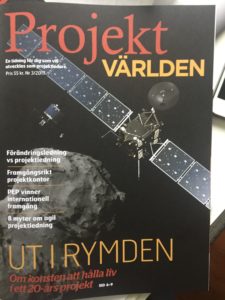 Some time ago, Linda Rouleau, Mark De Rond, and I had our article.. published in Journal of Management Studies. Hopefully, researchers become interested in extreme contexts, or it helps to articulate some interesting aspects for researchers that are already interested in extreme contexts. You find the article here: https://onlinelibrary.wiley.com/doi/pdf/10.1111/joms.12649
Some time ago, Linda Rouleau, Mark De Rond, and I had our article.. published in Journal of Management Studies. Hopefully, researchers become interested in extreme contexts, or it helps to articulate some interesting aspects for researchers that are already interested in extreme contexts. You find the article here: https://onlinelibrary.wiley.com/doi/pdf/10.1111/joms.12649
Category: Publication
Accepted for publication: The dark side of group behavior: Zombie apocalypse lessons
 Today, while walking the dog, I opened my email and found out that David Buchanan and my article “The dark side of group behavior: Zombie apocalypse lessons” is accepted for publication in Academy of Management Perspectives (http://aom.org/Publications/AMP/Academy-of-Management-Perspectives.aspx) . Abstract below.
Today, while walking the dog, I opened my email and found out that David Buchanan and my article “The dark side of group behavior: Zombie apocalypse lessons” is accepted for publication in Academy of Management Perspectives (http://aom.org/Publications/AMP/Academy-of-Management-Perspectives.aspx) . Abstract below.
Abstract:
 How will groups of survivors behave in a doomsday scenario? Will there be competition for scarce resources? Will they collaborate in reconstruction? We cannot research these questions directly, but we can find clues in four places. First, there are historical examples of apocalyptic events. Second, social identity theory offers explanations of group behavior. Third, there are studies of group dynamics in extreme contexts. We discuss the limitations of those three sources, prompting us to turn to a fictional account in search of ideas. Adopting a narrative theoretical lens, we consider ‘the theory on offer’ in the television series The Walking Dead, which portrays a zombie apocalypse. We find that group behavior is shaped by the nature of survivor group composition, and by the properties of the doomsday context they face. We demonstrate the potential for the emergence of a dark, violent side of group behavior. We illustrate a methodological solution to the problem of researching extreme contexts using ‘speculative fiction’. And we break new ground by exploiting the zombie movie genre, which addresses the ‘failure of imagination’ that can increase society’s vulnerability to unforeseen events. Our analysis has implications for organization theory, and for policy and practice in doomsday scenarios.
How will groups of survivors behave in a doomsday scenario? Will there be competition for scarce resources? Will they collaborate in reconstruction? We cannot research these questions directly, but we can find clues in four places. First, there are historical examples of apocalyptic events. Second, social identity theory offers explanations of group behavior. Third, there are studies of group dynamics in extreme contexts. We discuss the limitations of those three sources, prompting us to turn to a fictional account in search of ideas. Adopting a narrative theoretical lens, we consider ‘the theory on offer’ in the television series The Walking Dead, which portrays a zombie apocalypse. We find that group behavior is shaped by the nature of survivor group composition, and by the properties of the doomsday context they face. We demonstrate the potential for the emergence of a dark, violent side of group behavior. We illustrate a methodological solution to the problem of researching extreme contexts using ‘speculative fiction’. And we break new ground by exploiting the zombie movie genre, which addresses the ‘failure of imagination’ that can increase society’s vulnerability to unforeseen events. Our analysis has implications for organization theory, and for policy and practice in doomsday scenarios.
PUBLISHED: Buchanan & Hällgren – “Surviving a zombie apocalypse: Leadership configurations in extreme contexts”

David Buchanan and I just had our leadership article based on the zombie classic “Day of the Dead” by George Romero published in pre-print. Available at the journal of “Management Learning”. If you´d like a copy drop me an email…
Abstract
What can the classic zombie movie, Day of the Dead, tell us about leadership? In our analysis of this film, we explore leadership behaviours in an extreme context – a zombie apocalypse where survivors face persistent existential threat. Extreme context research presents methodological challenges, particularly with regard to fieldwork. The use of films as proxy case studies is one way in which to overcome these problems, and for researchers working in an interpretivist perspective, ‘social science fiction’ is increasingly used as a source of inspiration and ideas. The contribution of our analysis concerns highlighting the role of leadership configurations in extreme contexts, an approach not previously addressed in this field, but one that has greater explanatory power than current perspectives. In Day of the Dead, we observe several different configurations – patterns of leadership styles and behaviours – emerging, shifting and overlapping across the phases of the narrative, each with radically different consequences for the group of survivors. These observations suggest a speculative theory of leadership configurations and their implications in extreme contexts, for exploring further, with other methods.
Rantatalo, Lindberg, Kihlberg & Hällgren – Negotiations and Research Bargains: Bending Professional Norms in the Effort to Gain Field Access
 This morning Ola received the news that our paper is available to everyone. The paper is published on an “open access” basis and as a consequence open to anyone! It details the methodological struggles that we have had with one of our projects, and the kind of challenges and opportunities that arose from those – and how we navigated the treacherous waters.
This morning Ola received the news that our paper is available to everyone. The paper is published on an “open access” basis and as a consequence open to anyone! It details the methodological struggles that we have had with one of our projects, and the kind of challenges and opportunities that arose from those – and how we navigated the treacherous waters.
You find the paper here
Abstract
The present study provides an autoethnographic account of the efforts to gain field access to a police organization, spanning more than 2 years. The aim is to describe a case of gaining access in relation to the professional norms of science put forward by Robert K. Merton. Aided by an organized record of notes, e-mails, and other written communications regarding access (144 memos of various types), the study describes and discusses the negotiations with Mertonian norms that followed from the dissonance between ideals of research and practical reality. Opening up for further scholarly discussion, this article concludes that Merton’s norms are incongruent with both prevailing guidelines of research ethics and with the practical, short-term problems of access negotiations and research bargains.
“A Matter of Life or Death: How Extreme Context Research Matters for Management and Organization Studies” now published in Academy of Management Annals
 The other day Linda Rouleau, Mark de Rond and mine paper “A Matter of Life or Death: How Extreme Context Research Matters for Management and Organization Studies” was published in the Academy of Management Annals journal. It was a lot of hard work so they are really pleased to finally see it in print. Hopefully it will make a difference in how we conceptualize, theorize and approach extreme contexts in the future. Naturally I am kind of happy about this and somewhat proud..
The other day Linda Rouleau, Mark de Rond and mine paper “A Matter of Life or Death: How Extreme Context Research Matters for Management and Organization Studies” was published in the Academy of Management Annals journal. It was a lot of hard work so they are really pleased to finally see it in print. Hopefully it will make a difference in how we conceptualize, theorize and approach extreme contexts in the future. Naturally I am kind of happy about this and somewhat proud..
You find the article here or you can email me on markus.hallgren(at)umu.se if you´d like a copy. Please share with others that you think might be interested!
Abstract
Organization scholarship has seen an escalation of interest in research into extremes. Comprising several interconnected domains, this growing body of research is decidedly fragmented. This fragmentation risks limiting its potential for advancing management and organization studies. Drawing on 138 articles published in top-tier journals between 1980 and 2015, the purpose of this review is to resolve some of this fragmentation by sharpening definitions and by developing a context-specific typology to help differentiate between contributions from research into risky contexts, emergency contexts, and disrupted contexts. Doing so allows us to let the various literatures speak to each other and to outline ways to enhance the cumulative potential of extreme context research.
Negotiations and research bargains: Bending professional norms in the effort to gain field access accepted for publication in International Journal of Qualitative Methods
 Today Ola, Robert, Ola and I had the pleasant news that their article “Negotiations and research bargains: Bending professional norms in the effort to gain field access” was accepted for publication in International Journal of Qualitative Methods.
Today Ola, Robert, Ola and I had the pleasant news that their article “Negotiations and research bargains: Bending professional norms in the effort to gain field access” was accepted for publication in International Journal of Qualitative Methods.
Worth mentioning this was Robert´s first. More to come!
Abstract
The present study provides an auto-ethnographic account of the efforts to gain field access to a police organization, spanning more than two years. The aim is to describe a case of gaining access in relation to the professional norms of science put forward by Robert K. Merton. Aided by an organized record of notes, emails and other written communications regarding access (144 memos of various types), the study describes and discusses the negotiations with Mertonian norms that followed from the dissonance between ideals of research and practical reality. Opening up for further scholarly discussion, the article concludes that Merton’s norms are incongruent with both prevailing guidelines of research ethics as well as with the practical, short-term problems of access negotiations and research bargains.
What is already known?
Obtaining field access in organizations is an increasing problem for qualitative researchers. The literature on gaining access is providing strategies that researchers can use, as well as problematizing the ethical issues involved when bargaining with organizations. However, the literature has not hitherto engaged with the problem of how access negotiations affect the types of research questions asked, the way results are presented, and, consequently, what the role of research in society ought to be.
What this paper adds?
Using Merton’s norms of science (universalism, communalism, disinterestedness and organized skepticism) as a reference, the paper shows how the realities of research bargaining are at odds with research ideals such as impartiality, rationality and, in particular, freedom and autonomy from often competing societal interests. It also shows that prevailing ethical guidelines such as ‘informed consent’ might, in the effort to gain access, be problematic in relation to these ideals. With these arguments, the paper seeks to expand the debate on the problems of access to organizations to include the role of research in society.
Article published in Projektvärlden on boredom
 In the recent number of Projektvärlden I published a article about boredom. Essentially the point is that boredom is dangerous but it can be managed by relying on routines and updating communication patterns. You find the article here
In the recent number of Projektvärlden I published a article about boredom. Essentially the point is that boredom is dangerous but it can be managed by relying on routines and updating communication patterns. You find the article here
Martin & mine article “Sensemaking in sensory deprived settings: The role of non-verbal auditory cues for emergency assessment”
…is now available for download from European Management Journal. In the article we investigate how emergency call centers make sense of their input using non-verbal cues. Pretty interesting if we get to say it ourselves! You find a link here.